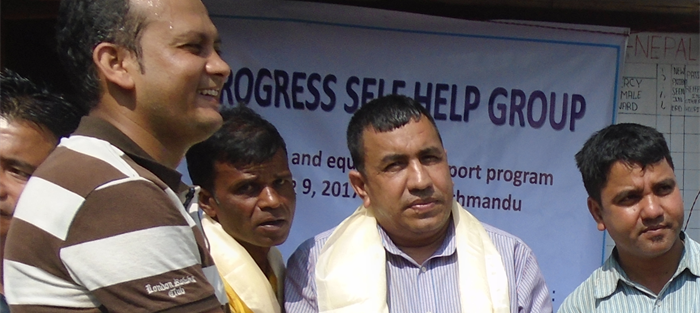Walk a mile in my shoes and see what leprosy means

I’m Taranath and I am from Nepal. I grew up about three hours away from Kathmandu. My parents had not received much education and they made a living through farming. They did not take me and my siblings to school because they didn’t understand the importance of education, so I spent my time working in the fields with my parents until some teachers from a local school visited my home and requested that I attend school.
I excelled at school and was able to get a scholarship. I was happy there, but when I was 10 years old, I got dry and red skin patches in many places on my body that had no sensation, no itching, and no pain. The fingers on my right hand were becoming weak and the fingers started to contract and claw. One day I was very near a fire in the cold season and I could put my hand very near the fire for a long time without feeling anything.
As my body began to suffer more and more, my parents grew sad, but they didn’t know that they needed to take me to the hospital, so they took me to receive traditional treatments from a witchdoctor. My parents believed that God was angry and he was punishing me. I had many sleepless nights thanks to these treatments. These are bitter memories for me from a time when I was so young. The illness had nothing to do with God being angry and there was a cure that was freely available, but I didn’t receive it for a long time.
Thankfully, my uncle visited from Kathmandu one day and he told my parents that I might have leprosy. He gave us the address for The Leprosy Mission’s Anandaban Hospital and we travelled there to find out more.
At Anandaban, I was diagnosed with leprosy and I was admitted for treatment, which included reconstructive surgery and MDT, which is the combination of antibiotics which is used to cure leprosy; the treatment I had needed for so long. My mother came with me to Anandaban and she stayed there with me while I recovered. She cried so much while she was there because she saw the disabilities that leprosy had caused in so many of the other patients. She became very distressed and the team at the hospital had to support her with some medication, counselling, and education around what leprosy is and how it’s treated.
I had some neighbours and relatives who visited me at the hospital, but they were also distressed by seeing how leprosy can so badly damage a body. By the time I came back to my village, my friends would not speak to me. Our neighbours and relatives would no longer come to our home. They were afraid of the disease and afraid of me because they did not understand the disease. I dropped out of school because I faced too much discrimination and stigma.
We went back to Anandaban to receive help from The Leprosy Mission. They gave me counselling support and helped me to continue my studies. When I’d finished school they helped me to find a job at a rehabilitation centre where I could help other persons affected by leprosy and disabilities.
I received training and I excelled in the work as a physiotherapists’ assistant, as I had in school. Some European visitors to the Centre were really impressed by my work and they told the head of the Centre that I should receive a promotion and a better salary. The head of the Centre refused, he said that I am a leprosy-affected person and so my mind is not in balance and I am like a mad person and they shouldn’t have any further contact with me. After this, the Centre’s Board treated me differently and started to isolate me. I felt hurt at that time, I was very sad and I felt like I’d lost my dignity. I don’t understand how they could have thought this about me.
Despite all of that sadness, I am now working as an employment counsellor at The Leprosy Mission’s FOUND project. I am happy in my job, which allows me to support many other persons affected by leprosy and disabilities. I help them to find jobs and the dignity that I know can come with those jobs. Because of the sadness I have faced in my life, I want to use my work to make life better for other people who face such stigma. I want to change perceptions around leprosy and make Nepal a safer and happier place for all people who have or will experience the disease.